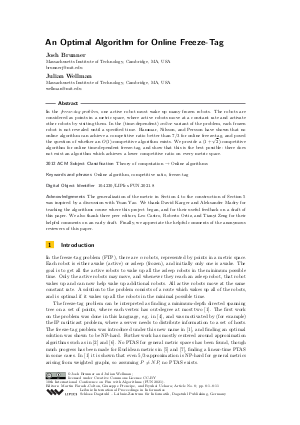An Optimal Algorithm for Online Freeze-Tag
Authors Josh Brunner, Julian Wellman
-
Part of:
Volume:
10th International Conference on Fun with Algorithms (FUN 2021)
Part of: Series: Leibniz International Proceedings in Informatics (LIPIcs)
Part of: Conference: International Conference on Fun with Algorithms (FUN) - License:
 Creative Commons Attribution 3.0 Unported license
Creative Commons Attribution 3.0 Unported license
- Publication Date: 2020-09-16
File

PDF
LIPIcs.FUN.2021.8.pdf
- Filesize: 394 kB
- 11 pages
Document Identifiers
Subject Classification
ACM Subject Classification
- Theory of computation → Online algorithms
Keywords
- Online algorithm
- competitive ratio
- freeze-tag
Metrics
- Access Statistics
-
Total Accesses (updated on a weekly basis)
0PDF Downloads0Metadata Views
Abstract
In the freeze-tag problem, one active robot must wake up many frozen robots. The robots are considered as points in a metric space, where active robots move at a constant rate and activate other robots by visiting them. In the (time-dependent) online variant of the problem, each frozen robot is not revealed until a specified time. Hammar, Nilsson, and Persson have shown that no online algorithm can achieve a competitive ratio better than 7/3 for online freeze-tag, and posed the question of whether an O(1)-competitive algorithm exists. We provide a (1+√2)-competitive algorithm for online time-dependent freeze-tag, and show that this is the best possible: there does not exist an algorithm which achieves a lower competitive ratio on every metric space.
Cite As Get BibTex
Josh Brunner and Julian Wellman. An Optimal Algorithm for Online Freeze-Tag. In 10th International Conference on Fun with Algorithms (FUN 2021). Leibniz International Proceedings in Informatics (LIPIcs), Volume 157, pp. 8:1-8:11, Schloss Dagstuhl – Leibniz-Zentrum für Informatik (2020)
https://doi.org/10.4230/LIPIcs.FUN.2021.8
BibTex
@InProceedings{brunner_et_al:LIPIcs.FUN.2021.8,
author = {Brunner, Josh and Wellman, Julian},
title = {{An Optimal Algorithm for Online Freeze-Tag}},
booktitle = {10th International Conference on Fun with Algorithms (FUN 2021)},
pages = {8:1--8:11},
series = {Leibniz International Proceedings in Informatics (LIPIcs)},
ISBN = {978-3-95977-145-0},
ISSN = {1868-8969},
year = {2020},
volume = {157},
editor = {Farach-Colton, Martin and Prencipe, Giuseppe and Uehara, Ryuhei},
publisher = {Schloss Dagstuhl -- Leibniz-Zentrum f{\"u}r Informatik},
address = {Dagstuhl, Germany},
URL = {https://drops.dagstuhl.de/entities/document/10.4230/LIPIcs.FUN.2021.8},
URN = {urn:nbn:de:0030-drops-127693},
doi = {10.4230/LIPIcs.FUN.2021.8},
annote = {Keywords: Online algorithm, competitive ratio, freeze-tag}
}
Author Details
Acknowledgements
The generalization of the metric in Section 4 to the construction of Section 5 was inspired by a discussion with Yuan Yao. We thank David Karger and Aleksander Madry for teaching the algorithms course where this project began, and for their useful feedback on a draft of this paper. We also thank three peer editors, Leo Castro, Roberto Ortiz, and Tianyi Zeng for their helpful comments on an early draft. Finally, we appreciate the helpful comments of the anonymous reviewers of this paper.
References
-
Esther M Arkin, Michael A Bender, Sándor P Fekete, Joseph SB Mitchell, and Martin Skutella. The freeze-tag problem: how to wake up a swarm of robots. Algorithmica, 46(2):193-221, 2006.

-
Esther M Arkin, Michael A Bender, and Dongdong Ge. Improved approximation algorithms for the freeze-tag problem. In Proceedings of the fifteenth annual ACM symposium on Parallel algorithms and architectures, pages 295-303. ACM, 2003.

-
Mikael Hammar, Bengt J Nilsson, and Mia Persson. The online freeze-tag problem. In Latin American Symposium on Theoretical Informatics, pages 569-579. Springer, 2006.

-
Jochen Könemann, Asaf Levin, and Amitabh Sinha. Approximating the degree-bounded minimum diameter spanning tree problem. Algorithmica, 41(2):117-129, 2005.

-
Zahra Moezkarimi and Alireza Bagheri. A PTAS for geometric 2-FTP. Information Processing Letters, 114(12):670-675, 2014.

-
Marcelo O Sztainberg, Esther M Arkin, Michael A Bender, and Joseph SB Mitchell. Analysis of heuristics for the freeze-tag problem. In Scandinavian Workshop on Algorithm Theory, pages 270-279. Springer, 2002.

-
Ehsan Najafi Yazdi, Alireza Bagheri, Zahra Moezkarimi, and Hamidreza Keshavarz. An O(1)-approximation algorithm for the 2-dimensional geometric freeze-tag problem. Information Processing Letters, 115(6-8):618-622, 2015.

